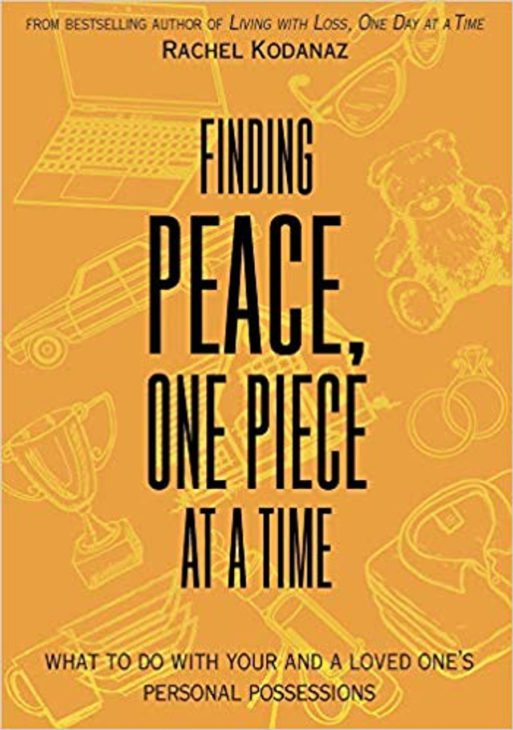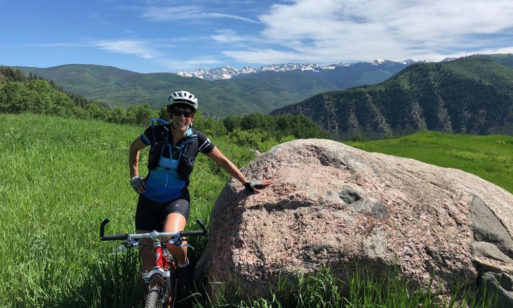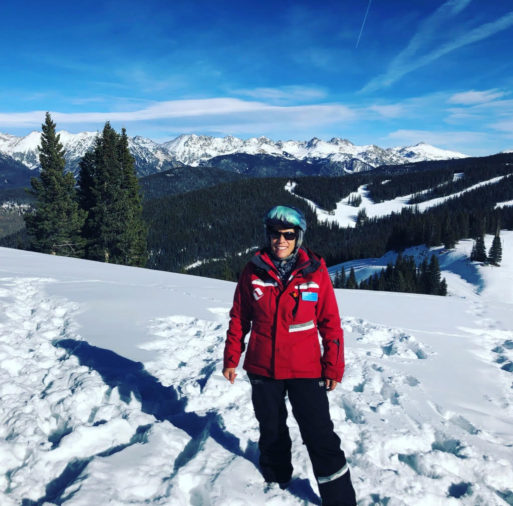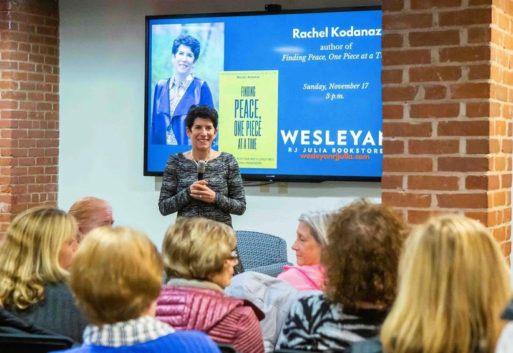
Kodanaz’s book serves as a guide for those struggling to figure out what to do with their loved one’s “stuff.”
Rachel Kodanaz is a seasoned writer, speaker, and motivator on the topic of life transitions, including grief. For over 20 years, Kodanaz has inspired audiences to embrace the challenges associated with the loss of a loved one. Her books, “Living with Loss One Day at a Time” and “Grief in the Workplace: A Comprehensive Guide to Being Prepared” have received international acclaim. Organizations like the American Association of Retired Persons, Hospice Foundation of America, and Tragedy Assistance Program for Survivors have featured her expert advice.
Kodanaz’s most recent book, “Finding Peace, One Piece at a Time: What to do with Your Loved One’s Personal Possessions,” offers practical tools and encouragement for those challenged with the difficult task of sorting through their loved one’s personal belongings. Her personal passion and professional insight expertly guide readers through their journey of repurposing the precious treasures of a lifetime.
Editor’s Note: This interview has been edited for length and clarity.
What spurred you to write and speak about the practical challenges associated with grief?
I was widowed at a young age when my husband, Rod, passed unexpectedly. I worked in telecommunications and started helping corporations to address grief and loss in the workplace. I wrote a short article in the late 1990s entitled, “Don’t Ask, Just Do” because I was tired of people continually asking what they could do for me. The article got picked up by a bereavement-oriented magazine and I started writing a column for them. That article spurred a whole new professional trajectory for me. I started writing and speaking about grief in the workplace throughout the country. I eventually settled back in Colorado and started a grief and loss center with a focus on peer support, which I believe is very helpful for most people.
I eventually wrote my first book “Living with Loss One Day at a Time.” The book was 365 daily lessons on love and loss. In 2018, my publisher contacted me about writing a follow-up to that book. I had been speaking about possessions for over 15 years with a focus on practical management of a deceased loved one’s belongings, so it made sense to focus on that topic. The title naturally evolved out of the notion that you have to live one day at a time, so “Finding Peace, One Piece at a Time” came to be. Much like we live with loss one day at a time, you can address just one piece at a time, as you sort and repurpose those personal possessions.

Rachel enjoys mountain biking in her home state of Colorado
You state that possessions are not just physical, but emotional items. What does that mean?
I didn’t really understand what possessions really meant to me until my husband died. I suddenly had all these belongings that belonged to just him. All this stuff has meaning. How do I work through it?! How do I decide what to keep? It threw me for a loop because I knew these things were worthy of more than trash or donation.
It is not about whether someone had a hundred t-shirts, it’s really about what the connection to those items may be. Each one of those expressed him or her as a person, where they came from and how they found their way through life. I like to refer to possessions as more than physical. Those items are an extension of them. They tell their life story.
How do you know when the time is right to begin the process of sorting your loved one’s belongings?
The timeline is yours; it is not someone else’s. Even if you have to move or vacate your home, the timeline is still yours. Because you can pack it up and decide what to do with it later. I encourage people not to go through the belongings too quickly because you may not be emotionally ready to decide what you want to keep for the future. What I suggest is that you take the time you need. If there is a trigger that occurs like a move, or maybe you feel like it is the time to tackle those things for some reason, I suggest you take advantage of that trigger.
When my husband passed away, I didn’t care what other people thought about his stuff all around the house two years following his death. His things were still in the closet and his running shoes still sat by the door. I just felt the need to keep his belongings, so I could feel connected to him. A friend of mine came to town and asked if he could borrow one of Rod’s suits. I told him to take them all. I realized I didn’t have an emotional connection to those. I just had not started the sorting process yet. This was the trigger I needed to feel good about moving forward with that process. Triggers might include a desire to repurpose a room or make more room in a closet for your belongings. Whatever the reason may be, if there is a trigger and feels good to you, accept it.

Rachel is a member of the Special Operations team on Vail Mountain in Colorado, working to enhance all aspects of the guest experience.
Once someone feels ready, how do you recommend they begin?
Don’t be too aggressive. Break it down into smaller parts. Start in areas of your house with items you don’t see every single day, so you can close the door if it overwhelms you in any way. Main areas of the house may be too difficult to begin since you see or use these items more often.
Sorting and thinning out is a more meaningful approach then cleaning out. Create piles of what you want to keep, share, donate, sell, trash, recycle, etc. Create a magic pile, a pile to ponder later if you can’t make an immediate decision on some items. This way, you don’t delay the entire project. Organizers may disagree with this suggestion, but they generally don’t deal with someone else’s possessions in this way. Go through that pile as many times as you need when you are ready.
This process can be less overwhelming if you build a team of helpers. Maybe you know someone that is good at helping you make decisions, someone that you trust. It can also be helpful to have someone act as your runner, or someone that keeps the process moving forward by folding or bagging items. The nurturer is someone that makes sure you eat, stay hydrated and don’t overdo it. These roles can all be accommodated by just one person or many people. Whatever it is you may need, surround yourself with friends or family that can help you through the process.

Rachel Kodanaz speaks at Wesleyan University in Connecticut in 2019.
What is the best approach we can take to help a grieving person to begin to sort through these items?
If you know someone that has lost a loved one, you can offer to be one of their helpers in this way. Be engaging. Ask questions about the items. Ask questions about the person. For example: “Do you remember when you got this?” Encourage the person to make a connection with the items. There can be some beautiful life stories behind them worth sharing. If you get a rhythm going, there can be joyous moments along the journey.
Just remember that everybody is different. Don’t force it. Just figure out how to hold their particular hand through this process. Savor the stories. Help them remain connected to their loved one. You can help them to find peace, one piece at a time.
“Finding Peace, One Piece at a Time: What to do with Your Loved One’s Personal Possessions” lends additional insight on how to address more complicated possessions like collections, digital media, and gifting personal items to others. You can visit www.RachelKodanaz.com to learn more.

 Your Loved One’s Possessions Are More Than Just “Stuff”
Your Loved One’s Possessions Are More Than Just “Stuff”


 “Songbird” by Fleetwood Mac
“Songbird” by Fleetwood Mac
 First the Wealth Gap, Now the U.S. Has a Growing Health Gap
First the Wealth Gap, Now the U.S. Has a Growing Health Gap















